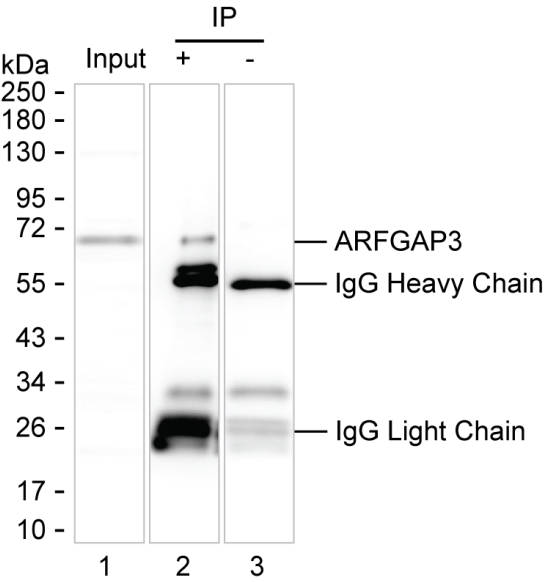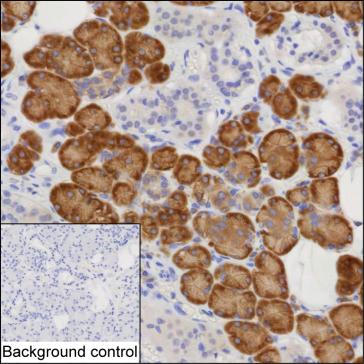

| WB | 咨询技术 | Human,Mouse,Rat |
| IF | 1/100-1/200 | Human,Mouse,Rat |
| IHC | 1/500-1/1000 | Human,Mouse,Rat |
| ICC | 技术咨询 | Human,Mouse,Rat |
| FCM | 咨询技术 | Human,Mouse,Rat |
| Elisa | 咨询技术 | Human,Mouse,Rat |
| Host/Isotype | Mouse IgG2b |
| Antibody Type | Primary antibody |
| Storage | Store at 4°C short term. Aliquot and store at -20°C long term. Avoid freeze/thaw cycles. |
| Species Reactivity | Human |
| Immunogen | Purified recombinant fragment of human ARFGAP3 |
| Formulation | Purified antibody in PBS with 0.05% sodium azide |
+ +
以下是关于ARFGAP3抗体的3篇参考文献的简要信息,涵盖抗体开发和应用方向:
---
1. **文献名称**:*ARFGAP3 regulates the assembly of the post-Golgi recycling network*
**作者**:Tanabe et al. (2019)
**摘要**:研究通过开发特异性ARFGAP3多克隆抗体,验证其在细胞内的定位,发现ARFGAP3参与高尔基体后膜泡运输,抗体用于免疫荧光和Western blot证实其在HeLa细胞中的表达及功能。
2. **文献名称**:*Monoclonal antibody characterization of ARFGAP3 in breast cancer progression*
**作者**:Liu et al. (2021)
**摘要**:团队制备了抗ARFGAP3的单克隆抗体,通过免疫组化分析乳腺癌组织样本,揭示ARFGAP3高表达与肿瘤转移的相关性,抗体特异性经siRNA敲低实验验证。
3. **文献名称**:*Development of a novel ARFGAP3 antibody for neuronal trafficking studies*
**作者**:Garcia-Ruiz et al. (2017)
**摘要**:报道一种新型ARFGAP3兔源抗体的开发,应用于神经元细胞模型,证明其在调控突触小泡运输中的作用,抗体经质谱和肽段竞争实验验证特异性。
---
**备注**:若需具体文献链接或更多细节,建议通过PubMed或Google Scholar以标题/作者关键词检索。部分研究可能侧重抗体工具开发,而另一些则聚焦于疾病机制中的抗体应用。
**Background of ARFGAP3 Antibody**
ARFGAP3 (ADP-ribosylation factor GTPase-activating protein 3) is a member of the ARFGAP family, which regulates vesicular trafficking and membrane remodeling by accelerating GTP hydrolysis in ARF (ADP-ribosylation factor) proteins. ARFGAP3 primarily localizes to the Golgi apparatus and plays a role in COPI (coat protein complex I)-mediated retrograde transport, Golgi homeostasis, and lipid droplet formation. Its structure includes a conserved ARFGAP domain critical for GTPase activity and a GATA-like zinc finger domain involved in lipid binding.
Antibodies targeting ARFGAP3 are essential tools for studying its expression, intracellular localization, and interactions. They are widely used in techniques like Western blotting, immunofluorescence, and immunoprecipitation to investigate ARFGAP3's regulatory mechanisms in cellular processes. Dysregulation of ARFGAP3 has been linked to cancers, neurodegenerative disorders, and metabolic diseases, making these antibodies valuable for exploring disease mechanisms.
Commercial ARFGAP3 antibodies are typically raised against specific epitopes, such as recombinant protein fragments or synthetic peptides. Researchers must validate antibody specificity using knockout controls or siRNA-mediated silencing. Applications often focus on ARFGAP3's role in secretory pathways, lipid metabolism, or its interplay with ARF isoforms (e.g., ARF1). Recent studies also highlight its potential as a therapeutic target, emphasizing the importance of reliable antibody reagents in both basic and translational research.
×